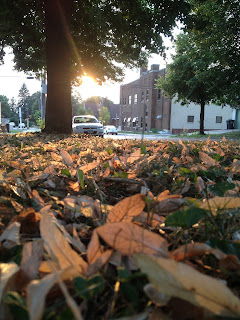"This is the day that the Lord has made."
What day?
Obviously, this particular day, made up
of 24 hours. Or for the Romans, 12 horae. Or however else we want to
divide the light we've been given. Every bit of it has been fashioned
by the Creator, the one who said let there be Light, and divided the
light from the darkness, and called the light day. Speaking of the
Romans, their night hours were divided into 4 vigiliae, which means
watches (like vigilant). That's quite telling! Day is so desirable
that the night hours are spent watching for it. The students I
have the privilege of teaching just read the tragedies of Aeschylus,
which begin with a watchman waiting for the light of morning as for a
beacon. And in Psalm 118, the poet waits for the Lord “more than
the watchman waits for the morning, more than the watchman waits for
the morning." It's almost like he repeats this to himself in
order to keep his grainy eyes squinting despite his weariness.
Whether you're a night owl or whether
you really do love mornings, there is a deep longing in all of us for
light, for the sun. We feel it especially acutely these winter days,
when the sun lays itself down rest in the afternoon, and is shy to
rise again in the morning. We are of the day, this day of the Lord!
Let us live like it, awake to the stunning realities all around us,
whether it's the curve of a parabola, the turn of phrase in a fine
story, or the quiet kindnesses of a fellow human.
I remember singing a song in Sunday
school as a little person: “This is the day, this is the day, etc."
Very perky. I sang it with gusto – both at church and at home.
Maybe a little too loud too early in the morning for my brother and
my mom, who needed more time before they were ready for my screechy
voice, however exuberant. And as I yelled it at the top of my lungs,
I was looking out the window, addressing that particular day –
whether it was pouring rain, floating snow, or bursting with sun rays
–declaring that THIS is the day! This one, right? Thursday December
5?
Yes. But I don't think that's only it.
Just this week, while reading Psalm 118, I had a realization
that knocked me back into my chair. The day we live in is oh so much
bigger than Thursday, Dec. 5. Check this out:
The stone that the builders rejected
has become the cornerstone.
This is the Lord's doing;
it is
marvelous in our eyes.
This is the day that the Lord has
made;
let us rejoice and be glad in it. (Psalm 118:22-24)
The stone that the builders rejected as
a cornerstone, a prophecy about Christ. He came down from heaven in
the form of a vulnerable little baby and from the very first was
rejected by humans who were apparently trying to building something
else. Despite all, despite death, he became the main stone that sets
the foundation. Who did it? Certainly those builders had nothing to
do with it; we had nothing to do with it. The Psalmist tells us:
“this is the Lord's doing.” We can marvel at it, like the
Psalmist, like the shepherds, like the Wise Men, but we certainly
didn't bring it about. Our calling is to marvel and rejoice at what
He's done for us.
Then do you see it?
What if “the Lord's doing” and “the
Day He's made” are one and the same? What if Christ becoming
Christmas for us (and Good Friday and Easter and our King Coming) -
what if it is all a Great Big Day we live in and breathe deep and
have our true being?
I think this is going to change how I
live, if I manage to let it sink in. When I awake to my alarm next
morning, I will not only bow my head and thank him for the breakfast
of this particular day – but maybe I'll remember this Great Big
Day, too, the one made up of Christmas, Good Friday, Easter, and the
hope of His Coming again all rolled into one.
My eyes catch on the verse on the
church bulletin: "First Sunday of Advent. The Spirit and
the Bride say come."
Yes! Come and relieve your watchmen.
Satisfy our aching hope.

























































